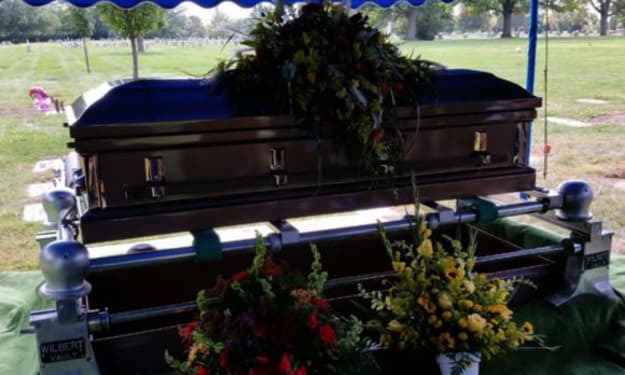Caregiver contracts keep siblings out of court
National caregiving expert offers advice for siblings feuding over mom's or dad's care

An earlier version of this article appeared on News Break.
My father’s dementia turned out to be the ugliest thing I ever experienced.
Worse than experiencing homelessness, which I did, on the streets of Denver.
Worse than my parents’ horrible marriage.
Worse than my mother’s death when I was only 24.
Worse than being assaulted.
Worse than seeing dad cry when he would get confused.
Not only did dad’s cognitive decline break my heart, but it ripped the family to pieces.
Family fights can erupt over anything
I’m not alone. As crazy as my family’s story is – and I’ll spare you the chilling details – it’s a scenario being played out every day, coast to coast, family to family.
For example, take radio superstar Casey Kasem. His children battled Kasem’s wife so they could be in control of their dad’s care. Country crooner Glen Campbell’s children did the same thing.
The story can go something like this: Dad begins to decline in his senior years, sometimes sooner rather than later. At some point, one of the siblings decides to take it upon themselves to begin checking in on the parent. What may start out as a daily visit to dad turns into three daily visits to dad.
Along the way, the caregiving sibling eventually ends up quitting his or her job. He or she becomes completely dependent on dad … for everything … even for his or her own medications, which the father forgets about and ultimately stops paying for.
Meanwhile, the other sibling knows nothing about the verbal abuse the caregiving sibling is enduring.
They don’t understand the fear of dad falling down the stairs. They have not been there the countless times the caregiver has to pick dad up off the floor.
Or how about mopping up dad’s urine and feces because he no longer uses the toilet properly?
Or constantly putting out fires (sometimes literally, in the case of the parent with dementia being a smoker).
Then there were the times the caregiver corralled dad back inside when he walked out the back door to mow the grass at 2 a.m.
Caregiver not always empowered to make decisions
Sometimes the caregiving sibling is not the sibling in charge of the parent’s affairs. When disaster strikes and the parent ends up in a facility, the sibling with power of attorney launches threat after threat at the sibling who already has been beaten down for years by the parent.
The resentment on both ends runs so deep, the battles sometimes become legal. The non-caregiving sibling sometimes feels the other sibling got a “free ride” for years and years. Depending on how much money he or she believes the caregiving sibling got out of the deal, the deeper the resentment is.
The sibling who did the caregiving all those years is left shaking his or her head, picking up the pieces of his or her own life. Meanwhile, the caregiving services that he or she provided for so many years for $12 a day, plus free housing, now costs dad $150 per day, possibly more.
Diane Carbo is the founder of CaregiverRelief.com. Diane is a registered nurse with almost four decades of experience. She specializes in elder care, including dementia care, as well as making the peace among feuding families.
“Some are told they lived in the house for free and shouldn’t have any of the estate,” Carbo told NBC News for a story about dementia ripping families apart. “Others are taken to court.”
I had my own conversation with Carbo. I asked her, “Can anything be done to avoid a court battle, even when it’s to the point of police involvement and siblings not speaking?”
Smoothing over rough spots between siblings
She said yes, and it’s called a binding caregiving contract. At some point, the siblings can sit down and decide who will do what to maximize the best care for the parent at the lowest cost.
A sibling might agree to make twice-daily visits to the nursing home in exchange for payment or rent-free housing in the parent’s home.
Siblings may also want to agree on end-of-life decisions for the parent. Deciding to place a person with dementia on hospice (choosing to end medications that may sustain life) is touchy. Most people with dementia cannot comprehend what hospice is or what is going on.
Carbo said the most important thing when placing a loved one in a facility is to make sure they are getting true medical care, and that the family is able to visit the loved one as much as possible.
Regardless of where a parent ends up, the way to ensure quality care is to make frequent, surprise visits.
Assisted living facilities not a medical model
Carbo warned against assisted-living facilities.
“Here’s the problem with assisted living. Family members think they have coverage with all the medical needs, that somebody is going to be there all the time if something happens. That’s not the case,” Carbo told me.
Carbo said stories of injured patients lying in a pool of blood for several hours before being found are not unheard of.
Certified nursing assistants fighting amongst themselves is not so unusual either.
“People think assisted living is the end all be all, because then a parent doesn’t have to go into an (even more expensive) nursing home,” she said. “What they don’t understand is, it’s the most dangerous type of setting for anybody.
“It’s a social model, not a medical model. The type of care you’re getting is somebody who works at Burger King giving you your medicine.”
Nursing home worker: No soap not their problem
Of course, some places aren’t that bad.
Others are worse.
The same goes with nursing homes. Carbo recalled visiting someone at a nursing home in Philadelphia. When she got to the man’s room, she could not find soap, towels, or a wash pan.
“The situation was so appalling I called the nursing supervisor,” Carbo said. “Their comment was that it wasn’t their problem.’”
Looks can be deceiving when it comes to elder facilities, Carbo warned. “I don’t care what the facility looks like. It may have the reputation of being the very best.
"But unseemly things go on, and it’s not always the best of care.”
Ultimately, sometimes the state steps in and takes control when siblings can’t get along and there is proof of neglect.
“Eventually, the nursing home goes after the (patient’s) house, so it’s good to hold on to it as long as possible as opposed to selling it. Once it’s sold, the money is easy to get.”
About the Creator
David Heitz
I am a journalist with more than 30 years' experience. Here at Vocal, I write mainly for Potent, Vocal's cannabis magazine. I have a PTSD diagnosis and a medical cannabis card. I have lived in a penthouse and also experienced homelessness.






Comments
There are no comments for this story
Be the first to respond and start the conversation.